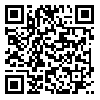Volume 16, Issue 2 (Summer 2024)
2024, 16(2): 76-82 |
Back to browse issues page
Ethics code: IR.RUMS.REC.1400.207
Download citation:
BibTeX | RIS | EndNote | Medlars | ProCite | Reference Manager | RefWorks
Send citation to:



BibTeX | RIS | EndNote | Medlars | ProCite | Reference Manager | RefWorks
Send citation to:
Shakri A S, Asadpour M, Ahmadinia H, Islami H, Neyestani H. Investigating the Effect of the Educational Intervention based on the Health Belief Model on the Preventive Behaviors of Infection Caused by Blood-borne Diseases in the Nurses of the ICU Departments of Imam Hassan (AS) Hospital in Bojnord City in 2022-2023. North Khorasan University of Medical Sciences 2024; 16 (2) :76-82
URL: http://journal.nkums.ac.ir/article-1-2998-en.html
URL: http://journal.nkums.ac.ir/article-1-2998-en.html
1- Master's Student in Health Education and Health Promotion, Department of Diseases, Vice President of Health, North Khorasan University of Medical Sciences, North Khorasan, Iran , azamsadat5263@gmail.com
2- Assistant Professor of Health Education and Health Promotion, Faculty of Health Education Department, Rafsanjan Health Faculty, Rafsanjan, Iran
3- Assistant Professor, Department of Epidemiology and Biostatistics, Faculty of Medicine, Work Environment Research Center, Pareshki University, Rafsanjan, Rafsanjan, Iran
4- Assistant Professor, Environmental Health Education Department, Faculty of Health, Rafsanjan Faculty of Health, Rafsanjan, Iran
5- Vice Chancellor for Health, North Khorasan University of Medical Sciences, Iran
2- Assistant Professor of Health Education and Health Promotion, Faculty of Health Education Department, Rafsanjan Health Faculty, Rafsanjan, Iran
3- Assistant Professor, Department of Epidemiology and Biostatistics, Faculty of Medicine, Work Environment Research Center, Pareshki University, Rafsanjan, Rafsanjan, Iran
4- Assistant Professor, Environmental Health Education Department, Faculty of Health, Rafsanjan Faculty of Health, Rafsanjan, Iran
5- Vice Chancellor for Health, North Khorasan University of Medical Sciences, Iran
Abstract: (1614 Views)
Introduction: Needle stick is one of the problems faced by the employees of healthcare centers, especially nurses. Considering the importance of this issue, the aim of this study was to investigate the effect of educational intervention based on the health belief model on the preventive behaviors of hepatitis B, hepatitis C, and AIDS infections among nurses in the ICU departments of Imam Hassan hospital in Bojnord city.
Method: The present descriptive-analytical study was conducted in an interventional way in 2022 on 76 employees of the ICU department of the the Imam Hassan hospital who were allocated in two experimental and control groups. The samples were selected by simple random sampling method. The data collection tool was a standard questionnaire. SPSS statistical software version 20 was used to analyze the data.
Results: The results showed that sharp object penetration training had a significant effect on the components of the health belief model, including perceived sensitivity, perceived intensity, perceived benefits, perceived barriers, symptoms for action and behavior, and exposure behaviors.
Conclusion: By holding training courses, the necessary information on the prevention of injuries caused by sharp objects should be transferred to the health and treatment staff.
Method: The present descriptive-analytical study was conducted in an interventional way in 2022 on 76 employees of the ICU department of the the Imam Hassan hospital who were allocated in two experimental and control groups. The samples were selected by simple random sampling method. The data collection tool was a standard questionnaire. SPSS statistical software version 20 was used to analyze the data.
Results: The results showed that sharp object penetration training had a significant effect on the components of the health belief model, including perceived sensitivity, perceived intensity, perceived benefits, perceived barriers, symptoms for action and behavior, and exposure behaviors.
Conclusion: By holding training courses, the necessary information on the prevention of injuries caused by sharp objects should be transferred to the health and treatment staff.
Type of Study: Orginal Research |
Subject:
Basic Sciences
Received: 2023/01/24 | Accepted: 2023/10/4 | Published: 2024/06/29
Received: 2023/01/24 | Accepted: 2023/10/4 | Published: 2024/06/29
Send email to the article author
| Rights and permissions | |
 |
This work is licensed under a Creative Commons Attribution-NonCommercial 4.0 International License. |







